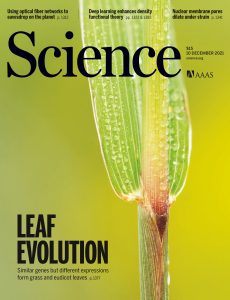
Science – 10 December 2021
English | 178 pages | pdf | 30.95 MBWelcome at Science Magazine 10 December 2021
Academic freedom is under fire across the world— from Hong Kong, where the Chinese government’s crackdown on open discussion has spurred an exodus of scholars from universities, to the United States, where there is a rising tide of antiintellectualism and assaults on free inquiry. The effort to undermine this cornerstone of American democracy has been driven by former President Trump and his administration, members of Congress, state governors, and legislators. Alas, it also comes from faculty and students on the ideological right and left, and even from some presidents of the country’s research universities.
These are powerful forces that must be overcome. The defense of academic freedom is never easy because the university is not a cloister and is no more a safe space from criticism or conflict than the society at large. Thus, there will be unpopular opinions expressed in scholarly research and in the classroom. But it is often unpopular opinions that shift paradigms, fell orthodoxies, and advance knowledge and inquiry to new levels of achievement. As the Kalven Committee stated in its 1967 report on the university’s role in political and social action in the United States, “a good university, like Socrates, will be upsetting.” De facto speech codes, the idea of “privileged knowledge,” and weaponizing misunderstood concepts such as “critical race theory” all limit research on political grounds and threaten academic inquiry from within its own environment. To cancel speeches, to sanction students or faculty for their views, to protect oneself from the upsetting ideas and language that are encountered in great texts and novels may “purify” universities but only by diminishing them. American academician Robert Hutchins, perhaps the greatest defender of academic freedom, said that the problem with witch hunts was “not how many faculty would be fired for their beliefs, but how many who think they might be…” Academic freedom can slip away slowly, and if ignored, could leave society in a climate of censorship, mistrust, and even fear. Now is the time for bold and courageous leadership. Presidents and provosts of universities in the United States need to act collectively by, for example, issuing a public statement that defends academic freedom.
Boards of trustees or regents should sign on as supporting this statement of principle. Moreover, the political and overly commercial influence on governing boards
must end. Members of these boards too often consist of political appointments or elected representatives with a political point of view. Thus, the tendency is for special interests to cloud their notions of how the university should be governed—from developing the institution’s mission and strategic goals to establishing policies. Rather than reinforcing university values—foundational academic, intellectual, and artistic freedoms— university governance is vulnerable to economic and political forces. People across this country, no matter what side of the political divide, want excellent education for their families. Universities must make the case that excellence is threatened by political interference and either restructure their boards or more closely scrutinize member influence.
In 1915, and again in 1940, the American Association of University Professors released a statement on the principles of academic freedom. It is time for these principles to be examined and fortified. US courts have defended academic freedom as falling in the penumbra of the Constitution’s First Amendment, which enforces the freedom of speech, among other rights. An update to these principles that ensures the free search for truth and its free exposition in the name of the common good would fortify academic freedom and potentially be codified into federal law. This effort could involve a presidential blue ribbon panel of experts that is open to new thinking about the principles. It should include discussion of free expression by students as well as faculty and protect remarks made outside their formal capacity as faculty members.
The university has a central role in the growth of knowledge, the exposure of students to diverse thoughts and differing views, and the preparation of a next generation for civic life. If that role is being undermined from outside or even within the university, its leaders should rise to its defense, even if it means jeopardizing their own jobs, or removing those leaders who are a threat.
It is a public principle worth defending at a high personal cost. When called for, such courageous action will educate the public and legislators on the importance of academic freedom.
Download from: